on Oct 15, 2024
¡En Conversación! Hispanic Heritage Month Spotlight: Engaging Community and Leveraging International Perspectives
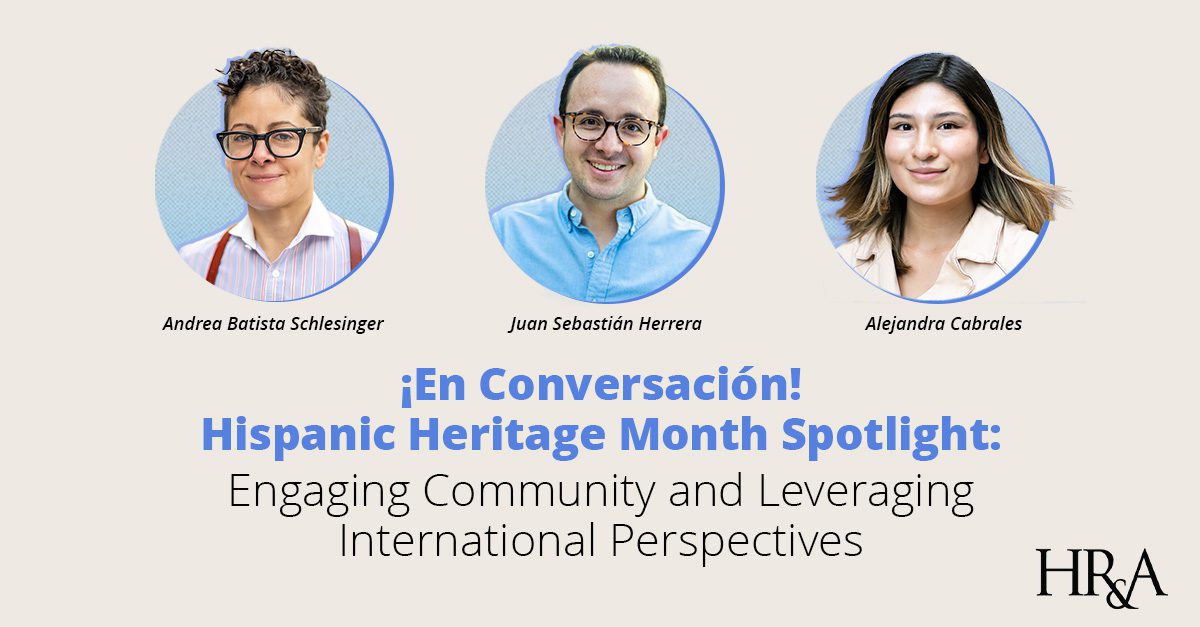
¡En Conversación! Hispanic Heritage Month Spotlight: Engaging Community and Leveraging International Perspectives
As we celebrate Hispanic Heritage Month, we’re highlighting the experiences and perspectives of Hispanic and Latine/o HR&Aers. We sat down with Andrea Batista Schlesinger, Juan Sebastián Herrera, & Alejandra Cabrales, to learn about how their personal experiences have influenced their professional work as well as what they’ve learned from working with Latine/o communities.
How has your background influenced your approach to your work, and how does your identity connect to what you’re doing day-to-day?
Alejandra: I was born in Mexico and moved to LA when I was seven. Growing up in a predominantly migrant community, I started thinking about the built environment and how it impacts families like mine. We were a transit-dependent family in LA, which had notoriously poor public transportation at the time.
I remember wondering, Who’s on the bus? Why are they on the bus? It was clear to me that access to transportation shaped the opportunities we had. Over time, I saw LA’s public transportation system develop and improve, and I personally felt the impact. I could access internships and music programs across the city because of these changes.
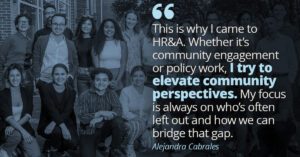
That experience made me realize I wanted to pursue a career that had a community impact. I constantly thought, Why aren’t people like my family ever brought to the table? Communities like ours are often the ones most affected by these decisions, yet we’re left out of the conversation. This is why I came to HR&A. Whether it’s community engagement or policy work, I try to elevate community perspectives. My focus is always on who’s often left out and how we can bridge that gap.
Juan: Coming from Latin America, I’ve noticed some stark contrasts between governance structures here in the U.S. and back home. In Latin America, governments often play a more visible role in providing public goods and services. But in the U.S., there’s a heavier reliance on the private sector to fill the gaps.
This dynamic has been eye-opening for me. I’ve become particularly interested in how public and private sectors collaborate — or fail to collaborate — and the impact that has on communities. At HR&A, this sensibility informs my approach to projects, particularly when they intersect with social equity and public policy.
I work a lot in on our public options projects. It’s through that lens that I analyze governance structures and the role they play in shaping our cities. My experience growing up in Latin America helps me bring a unique perspective to these projects, especially when it comes to equity and public policy.
Andrea: I want to emphasize how invaluable Juan’s perspective is. In urban policy, we often look at case studies or best practices, and we assume that all the answers are here in the U.S. The truth is, a lot of innovation — particularly in how local governments engage with communities — can come from other countries.
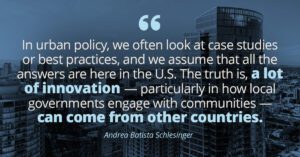
I come from a mixed background myself. My father was Jewish and grew up in the projects of Coney Island, and my mother grew up one of eight siblings in the Dominican Republic. I’ve seen how both of their upbringings shaped and informed their paths in life. My background has given me a sensitivity to what people say when they think no one is listening — particularly about how power considers marginalized communities. My identity plays a significant role in my work because I am driven to support visionary Latinx leaders. I entered this field 24 years ago, motivated by the goal of helping elect the first Puerto Rican Mayor of New York City. Though that candidate lost, and New York has yet to see a Latinx Mayor, progress is being made elsewhere — we’ve had a Latinx Mayor in Los Angeles.
It brings me deep personal fulfillment to support leaders like Lina Hidalgo in Harris County, the first Puerto Rican Chief of Staff to the Mayor of Chicago, and various mayors on the island. I understand how challenging it is to gain and retain power in these spaces, which makes these opportunities all the more meaningful.”
What can we learn from working with Latine/o and other marginalized communities in U.S. cities to help create inclusive and equitable futures for all?
Alejandra: I think there are interesting opportunities to learn from and collaborate with other marginalized communities. For example, I’ve noticed a significant amount of Credit Unions in LA’s Chinatown where I grew up. I would love to see the Latinx community learn from that model to fill in some of the significant banking gaps we experience. There’s a real need for us to empower each other and move forward collectively.
Andrea: One thing that stands out to me is how professionals in our field need to see identity not as a deficit, but as a strength. When I first joined HR&A, I remember working on a project for a city where the number of Spanish speakers was listed as a “challenge.” My first question was, Why is that a challenge and not an opportunity?
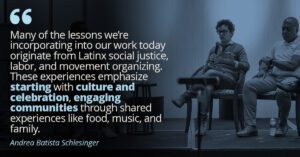
Many of the lessons we’re incorporating into our work today originate from Latinx social justice, labor, and movement organizing. These experiences emphasize starting with culture and celebration, engaging communities through shared experiences like food, music, and family. These are the approaches we’re now striving to embrace and integrate into our efforts.
Alejandra: I totally agree with Andrea. A lot of the sustainability practices I see today are things I grew up with — we just didn’t have the language for them. Living as sustainably as possible was something we always practiced in my family, and I think that’s true for many Latinx communities — there’s a deep-rooted sense of resourcefulness. Bringing that perspective into the climate space, where sustainability often feels dominated by other voices, is something I think is important. We belong in these conversations, and we have a lot to contribute.
Could you tell us a little bit about HR&A’s work in Puerto Rico?
Juan: HR&A’s story in Puerto Rico began in 2018 when we were commissioned by the Open Society Foundation to assess the feasibility of La Liga. At the time, it was an initiative aimed at helping municipalities recover after the devastating 2017 hurricane season, specifically Hurricane Maria.
Our work involved understanding the recovery needs of Puerto Rican cities, many of which had been hit hard not just by the hurricane, but also by years of financial instability. We designed a capacity-building program that connected Puerto Rican mayors with their counterparts in mainland U.S. cities, creating a corridor for sharing disaster recovery best practices.
Over time, our relationship with La Liga deepened, and by 2023, we were involved in another project, La Constructora, which focused on improving governance and decision-making at the municipal level in Puerto Rico. With the unprecedented influx of federal funding under the Biden administration, we saw a unique opportunity to transform how local municipalities on the island manage public resources and plan for the future. Our role was to help translate this opportunity into real change by supporting municipalities in navigating federal funding and building stronger governance structures.
What lessons-learned from our work in Puerto Rico can we apply to the broader challenges local governments face, both in the U.S. and internationally?
Juan: Our work in Puerto Rico offers lessons in how public services can be structured and delivered. We’ve been looking at the role of local governance on the island and how it shapes public services. It’s a chance to apply international insights to a U.S. context and improve systems for communities that are often overlooked.
Andrea: I completely agree with Juan. So much of what we’re doing in public banking and other areas is based on lessons learned from international case studies. And, like Juan said earlier, we have a lot to learn from countries outside the U.S. about how to engage communities and provide public goods. It’s not just about replicating models here — it’s about rethinking the role of local government, learning from other places, and using those insights to elevate our work.
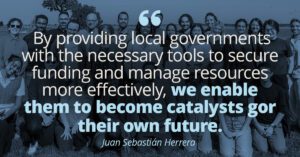
Juan: The challenges Puerto Rican municipalities face are not unique to the island. Many communities in the continental U.S., particularly rural areas, face similar issues: underfunded public services, lack of technical capacity, and a need for resilient infrastructure. We have learned that investing in capacity building at the local municipal level can bring about significant change, particularly when governments have suffered from years of underinvestment. By providing local governments with the necessary tools to secure funding and manage resources more effectively, we enable them to become catalysts for their own future.